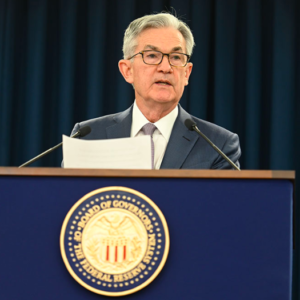Calling the fundamentals of the economy “strong,” the Federal Reserve made an emergency half-percentage-point rate cut on Tuesday in response to the economic dangers posed by the coronavirus. The reactions from business leaders, economists and the markets were mixed.
“The coronavirus poses evolving risks to economic activity,” the Fed said in a statement. “In light of these risks and in support of achieving its maximum employment and price stability goals, the Federal Open Market Committee decided today to lower the target range for the federal funds rate by 1/2 percentage point, to 1 to 1‑1/4 percent. The Committee is closely monitoring developments and their implications for the economic outlook and will use its tools and act as appropriate to support the economy.”
It was the first time the nation’s central bank has cut rates outside of a scheduled Fed meeting since the 2008 financial crisis — and business leaders and economists were quick to respond: Some praising the move, while others voicing skepticism that it will really boost the economy.
“It is a good idea for the Federal Reserve to cut its target rate in response to the coronavirus because the risk of the virus turning into a pandemic before an effective treatment becomes available, let alone a vaccine, is very real,” said WalletHub CEO Odysseas Papadimitriou. “That is not to be alarmist, but being proactive is the best strategy in insulating the economy.
“Consumer spending will go down if people stay home because of the coronavirus,” he said. “That in turn will hit a number of industries particularly hard, including small businesses in the service industry such as bars and restaurants, as well as travel providers, live entertainment venues, movie theaters, and more.”
Alfredo Ortiz, president and CEO of the Job Creators Network, agreed that the Fed made the right move.
“By lowering the cost of borrowing, the Fed is allowing small businesses to make up for coronavirus-related costs with less expensive borrowing terms, while providing a strong stimulus for consumer demand,” he said. “This aggressive move will help ensure that the broad economic prosperity enjoyed under the Trump administration is not dented by a black swan event.
“Coupled with the fall in the price of a barrel of oil price to $45, which will lower transportation costs and further increase consumer demand, the Fed’s move leaves small businesses well-prepared for the potential pandemic.”
Financial industry skeptics say there is little interest rate cuts can do if global supply chains become jammed, people stay at home so they don’t contract the virus and companies lay off workers.
“This is one of those exogenous shocks that is very difficult for the Fed to respond to because it’s not economic,” said Bernard Baumohl, chief economist of the Global Outlook Group.
One of their chief worries is that the Fed has reacted during the early stages of the outbreak.
“They just fired off their bazooka, and if it does no good, then what?” asked Stephen Stanley, chief economist at Amherst Pierpont Securities.
The Economic Policy Institute, a left-leaning think tank, suggests short-term measures that it says would build confidence and have a real economic impact — such as the government covering health spending related to the virus. The institute also proposes lawmakers provide short-term cash payments to households to make up the difference for workers who see their hours reduced as the virus spreads.
But Desmond Lachman, a former deputy director at the International Monetary Fund who is now at the right-leaning American Enterprise Institute, has a more mixed view.
“The Fed’s action is to be welcomed and it might provide some support to the economy and to financial markets,” he told InsideSources. “However, the basic problem with the coronavirus epidemic from an economic point of view is that it is involving a supply-side shock to the global economy. Cutting interest rates will not get quarantined Chinese workers back to work nor will it mend interrupted international supply chains.
“Having said that, interest rate policy coupled with fiscal policy measures might be needed to prevent the coronavirus supply-side shock from leading to excessively reduced demand and to the financial markets going into a doom loop.”
Fed Chairman Jerome Powell admitted there’s a limit to what the central bank can achieve.
“We do recognize a rate cut will not reduce the rate of infection. It won’t fix a broken supply chain. We get that,” Powell told reporters at a news conference. “We don’t think we have all the answers. But we do believe that our action will provide a meaningful boost to the economy.”
Powell’s comments did little to subdue critics of the rate cut, many of whom claimed it was premature. As evidence of their doubts, the stock market — after an initial hike — took another nosedive.
“The first was a knee-jerk reaction, ‘Oh, the Fed is coming to the rescue,’” said Joel Naroff of Naroff Economic Advisors. “The second reaction was, ‘Oh-oh, maybe the problem is worse than we think.’”

